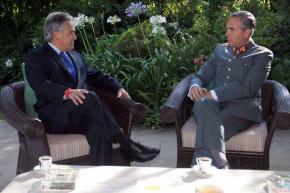Victory for the right in Chile
argues that the victory of right-winger Sebastián Piñera in Chile's presidential election sets the stage for new struggles to come.
MANY MAINSTREAM media reports on the Chilean run-off presidential election on January 17--won by the conservative candidate Sebastián Piñera over Eduardo Frei Ruiz-Tagle of the center-left--have emphasized that this is the first time in more than 50 years that a right-wing politician has been elected (allow me to underline this) to the presidency in Chile.
These same stories dismiss the 17 years during which Gen. Augusto Pinochet was in power as if they were a necessary interlude brought about by Chile's socialist adventure in the early 1970s.
True, it has been 52 years since the right wing won a presidential election, but from 1973 to 1990, the right was all over La Moneda (Chile's White House), giving political and logistical support to one of the bloodiest military dictatorship in recent history. Many of the same people who today share in and celebrate Piñera's victory, including the president-elect himself, then roamed freely through the corridors of power.
Those rushed judgments about the "democratic milestone" achieved in Chile are trying to dismiss what the last 20 years of governments of the Concertacion--the Concert of Parties for Democracy, the coalition that led Chile in the years after Pinochet--paved the way for: the re-legitimization of the right as a "democratic" alternative.

The democratic transition in Chile was supposed to be a process in which the Chilean people would rebuild democracy--which to those opposed to the dictatorship meant freeing the system from the straightjacket of the Pinochet constitution, particularly the system of representation that has allowed the right to possess half of the seats in Chile's Congress, while having the support of only about a third of the population.
Now we see that, in reality, this was an unfinished transition that ended up positioning the right to complete Pinochet's unfinished task--the privatization of CODELCO, the world's biggest copper-mining operation.
The nationalization of copper in Chile was one of the greatest achievements of the government of socialist Salvador Allende in the early 1970s, and one of the major grievances that the U.S. government had against it.
Pinochet and his free-market economist advisers--known as the Chicago Boys, because of their base at the University of Chicago--were able to privatize much of Chilean economy during the years of military terror. But CODELCO was untouchable, due to the resistance of the miners, who were the first to strike against the dictatorship, and the general public.
With revenues from the copper industry, the Chilean state, particularly during the Concertacion administrations, was able to ease the effects of neoliberalism on the poorest of the poor in Chile. But one day after his election, Piñera announced "deep changes" in the state-owned company, and even suggested a constitutional reform to allow private capital into CODELCO.
With the right in power, Corporate America is again salivating over the riches that Piñera can put on the table for them.
They can celebrate all they want. But they won't prevail. The Copper Workers Federation of Chile--the same organization that in 1978 stopped Pinochet from privatizing CODELCO and that five months ago went on strike and won a salary increase of 4 percent--didn't wait one hour before answering Piñera's words: If the government, moves ahead with privatization, the union said, "We will take action."


